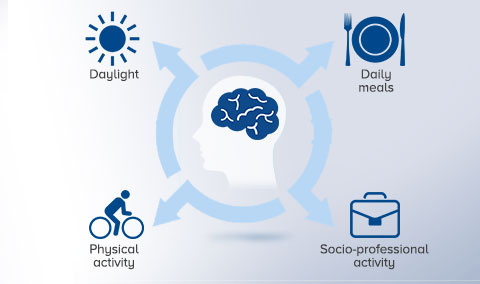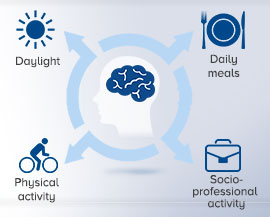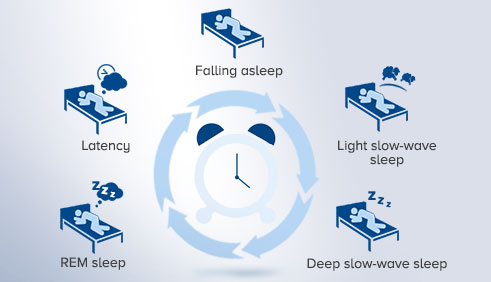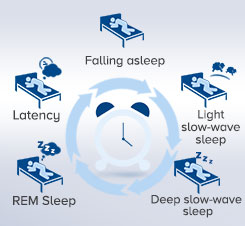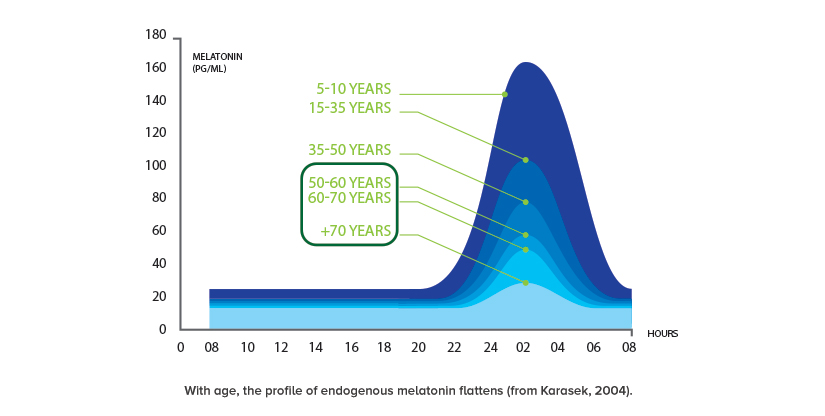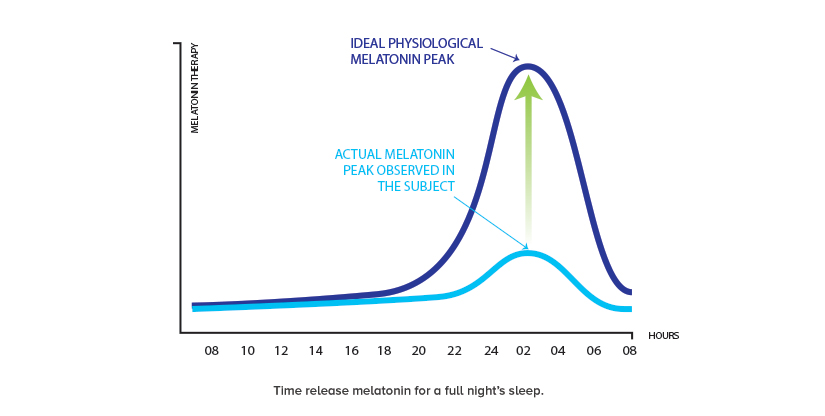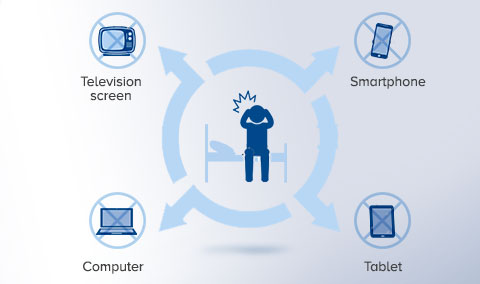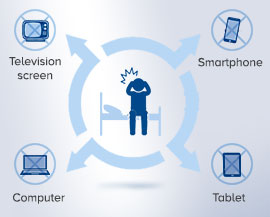
Our organism is subject to a biological rhythm, called the circadian rhythm, locked in a one-day cycle of around 24 hours. This biological cycle exists in all living beings and plays an important role in numerous biological, physiological and behavioural mechanisms.
Circadian rhythms
The functions of the organism such as the sleep-wake state, blood pressure, body temperature, the production of hormones (cortisol, melatonin for example), alertness and memory, are regulated by the circadian cycle.
The study of circadian cycles is called chronobiology. The term “circadian” comes from the Latin words, circa (around) and dies (day).
Circadian rhythms are endogenous, generated by the organism itself. To describe this internal temporal mechanism, we speak of a biological clock. This acts like the conductor of an orchestra, it imposes its rhythm on the organism.
Our biological clock is also sensitive to external phenomena: daylight, socio-professional activity, meals and physical activity act as signals and “resynchronise” our biological clock. These synchronisers allow each individual to adapt to their environment.
Daylight
Physical
activity
Daily
meals
Socio-professional
activity
It is light which influences our biological clock the most and acts in particular on falling asleep and awakening.
The secretion of Melatonin, called the “sleep hormone”, is typically circadian, controlled by our internal clock. It increases at the end of the day (before bedtime) in the absence of light and falls in the early morning. However, exposure to light late in the evening/too early in the morning shifts the production of melatonin; falling asleep may be delayed and awakening brought forward. The organism must therefore adjust to these shifts (time change, travelling abroad).
It is also recognised as reducing the effects of jet lag.
The sleep cycle
We spend a third of our life sleeping1. Sleep is essential to maintain the correct operation of physiological functions (regulation of mood, maintenance of alertness in the awake state, etc...). The need for sleep is an individual notion ranging from six to ten hours a night for “long sleepers”; on average, an adult needs eight hours of sleep a day2.
The sleep cycle is composed of 4 stages. Each stage lasts around 90 minutes, knowing that a night is composed of 3 to 5 successive cycles:
- Falling asleep: Brain activity slows down a little.
- Light slow-wave sleep: The sleeper is wakened by the slightest sound (stages 1 & 2).
- Deep slow-wave sleep: The slowing down of brain activity is magnified. The sleeper is insensitive to noises, their vital functions are maintained at the minimum (stage 3).
- REM sleep: This is a state in which the sleeper is difficult to wake, their muscle tone is abolished while their brain is as active as at the beginning. 80% of dreams take place during this phase.
- Latency (waking): Waking phase, the sleeper is more or less conscious. They can wake up or swing into another cycle.
Sleep problems associated with age
More than two thirds of individuals over 45 years of age have disrupted sleep3: difficulties in falling asleep, nocturnal awakenings or waking too early in the morning... It often results from reduced melatonin production, the natural sleep hormone, which occurs with age, because of calcification of the pineal gland.
The melatonin peak reached at around two o’clock in the morning, progressively flattens with age and can even disappear in individuals over 70 years of age with nocturnal concentrations of melatonin that are no longer higher than those observed during the day.
This reduction can cause difficulties in falling asleep at bedtime, frequent prolonged periods of wakefulness fragmenting the night and waking too early in the morning with the feeling that the night has been too short.
Time-release melatonin for a full night’s sleep
When sleep is impaired, a melatonin supplement is appropriate to restore high-quality sleep and days without drowsiness.
Rapid then prolonged release of appropriate active ingredients is ideal to enjoy a full night’s sleep by acting on the different phases of sleep:
- Facilitating falling asleep at bedtime. The beneficial effect is obtained by consuming 1 mg of melatonin before bedtime.
- Reducing nocturnal awakenings and improving the quality of sleep.
- Avoiding waking up early in the morning.
So this allows us to regain restorative sleep and to wake up feeling refreshed.
The combination of active ingredients such as plants and prolonged-release melatonin helps to promote a good night’s sleep.
The simple lifestyle rules to restore good quality sleep
- TO DO
- Respect the natural light, especially in the morning.
- Practice a sporting activity to feel healthy fatigue when you go to bed.
- Take naps which are no longer than 20 minutes (to avoid them impinging on the “sleep capital” of the night).
- Opt for calming activities and relaxation.
- Create an environment compatible with sleep (calm, cool, without lighting and without television).
- Go to bed only when you feel the need. If you have difficulties in going back to sleep, get up and go back to bed only when sleep returns.
- TO AVOID
- Stimulants after 4 pm (coffee, tea, coke, vitamin C, etc.).
- Heavy meals, difficult to digest, especially in the evening.
- Intensive physical or intellectual exercise (one hour before bedtime).
- Screens that reproduce daylight and which interfere with falling asleep.
- Do not miss your usual bedtime schedule.
- If you are awake for a long time, don’t stay in bed dwelling on problems and constantly checking the time.
Did you know?
The blue light emitted by screens for backlighting activates the non-visual photosensitive receptors of the retina one hundred times more than the white light of a lamp. Furthermore, it sends bad signals to our brain and disorients our biological clock when night falls as it inhibits the secretion of melatonin.
In order to prioritise restorative sleep, it is better therefore to turn off mobile phones, tablets, computers and television sets after 9 pm.
Television
screens
Computers
Smartphone
Tablets
1 Institut National du Sommeil et de la Vigilance. (National Sleep and Alertness Institute). The A to Z of sleep: How is sleep structured? Available at: www.institut-sommeil-vigilance.org
2 www.institut-sommeil-vigilance.org
3 The National Sleep Foundation commissioned WB&A Market Research to conduct a national survey among adults 55 to 84 years of age living in the United States - 1,506 older adults - the 2003 Sleep in America poll.
